Many may be surprised to find out that within Tolkien’s mythical world of Elves and Hobbits: of Frodo, Bilbo, Aragorn, and Legolas, there is lore of an ancient pantheon of “gods” that helped ruled over the world. The Valar, they are called, and they played a key role in the creation and ordering of Middle-earth.
What if I told you that this fictional pantheon is not actually related to paganism, but to the supreme ordering of divine beings that we see clearly laid out in the bible?
Before you write me off for promoting polytheism or the new age, let’s explore some often-overlooked sections of the Bible. Not only will they show us a completely different way of looking at reality, but we will find that in the creation of his pantheon, Tolkien may have been onto something that the world needs to rediscover.
Rediscovering the supernatural worldview
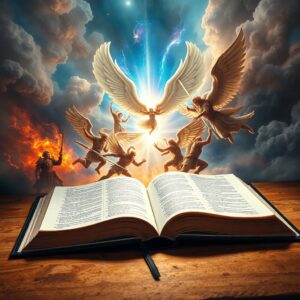
Before we delve into the connection between Tolkien and the Bible, it’s important to consider how anti-spiritualism has affected our understanding of the world. Modern society, and even modern Christianity, has often deviated from its roots in a deeply spiritual worldview—one inseparable from the Bible’s inerrant truth. In many ways, we have inadvertently removed the Bible from its original supernatural context, attempting to fit it into a secular framework.
However, this is beginning to change. Studies suggest that a significant majority of people now believe in a supernatural realm. Even those within Christian circles sense there’s “something more” beyond what has commonly been taught within the church. None of this should come as a surprise because a deeply spiritual worldview is, historically speaking, the normal state of humankind. We needn’t look far for direction for this “rediscovery”, however, for the key to reclaiming this perspective lies in re-examining the bible itself.
This approach has been championed by scholars like the late Dr. Michael Heiser, whose expertise in Hebrew language illuminated concepts such as the “Divine Council” and the “Deuteronomy 32 worldview”. His seminal work, The Unseen Realm, provides a foundation for understanding these ideas, which I will explore further in this post.
These supernatural concepts, rooted in biblical fact, have also been kept alive in the modern imagination through fictional works like Tolkien’s The Lord of the Rings. Bear with me as we explore these biblical concepts, as they all tie into Tolkien’s world and into your life.
What does the bible say about “gods”?
With the groundwork laid for the next part of this discussion, let us see what the bible says about beings referred to as “gods”:
- Exodus 15:11 “Who is like you oh lord, among the gods?”
- Exodus 20:3 “You shall have no other gods before me.”
- Deuteronomy 32:17 “They sacrificed to demons that were no gods, to gods they had never known, to new gods that had come recently, whom your fathers had never dreaded.”
- Isaiah 44:6 “I am the first and the last, among the gods.”
While many more verses could be cited, these examples demonstrate a clear pattern: the Bible acknowledges the existence of “gods” alongside the one true God. For further exploration, there are other resources that provide an extensive overview.
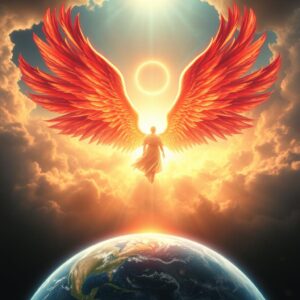
Despite this clear biblical stance, the Western church often overlooks the fact that literal “gods” were part of the worldview of the biblical followers of Yahweh. We tend to assume that ancient peoples were simply “misled” by a “simplistic” view of the universe because, well, “the gods” don’t exist- right?
Take Exodus 20:3, for example: “You shall have no other gods before me.” The modern church often interprets this as a prohibition against “symbolic idols”—anything that takes precedence over God. While this interpretation holds value, the original intent was likely more literal: do not worship other gods, but rather God himself.
This verse, notably the first of the Ten Commandments, underscores the literal understanding of other gods in the ancient world. If it were solely referring to figurative “gods”, why would the Bible dedicate so much attention to the existence of these beings? By interpreting these scriptures within their historical context, we gain a deeper understanding of the belief in the existence of other gods: beings not to be trifled with.
While this topic is expansive, it lies outside the core focus of this blog post. For those interested in delving further into the existence of ancient gods, in addition to Heiser’s The Unseen Realm, I recommend The Genesis 6 Conspiracy by Gary Wayne and The Return of the Gods by Jonathan Cahn.
The Divine Council
Now we’re really getting to the good stuff- namely, the concept of “The Divine Council”. What exactly is it?
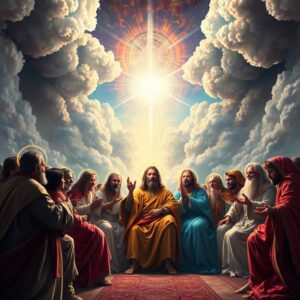
This is not a new concept, but rather one that was part of the worldview of ancient Jewish thought. Biblical records indicate that it was a part of first and second temple Judaism, roughly from 1000 BC to 70 AD – a time frame that coincides with Jesus’ life on Earth.
The Divine Council refers to the idea that God created a family of divine beings, often called “Elohim” in the Bible (a plural form of “Elohim,” another name for God). These beings are also known as “Watchers,” “Holy Ones,” and “Sons of God,” representing God’s “firstborn,” and preside in a “council” regarding matters on Earth. These beings are what we can think of as the original “gods”. One could refer to them as “Angels”, but this comparison is debated due to the imprecise nature of the term ‘angel.’
Where does this concept originate? Directly from the Bible. Let’s begin with Psalm 82, a key passage for understanding this concept:
Psalm 82 (ESV):
1 God has taken his place in the divine council;
in the midst of the gods he holds judgment:
2“How long will you judge unjustly
and show partiality to the wicked?
3 Give justice to the weak and the fatherless;
maintain the right of the afflicted and the destitute.
4 Rescue the weak and the needy;
deliver them from the hand of the wicked.”
5 They have neither knowledge nor understanding,
they walk about in darkness;
all the foundations of the earth are shaken.
6 I said, “You are gods,
sons of the Most High, all of you;
7 nevertheless, like men you shall die,
and fall like any prince.”
8 Arise, O God, judge the earth;
for you shall inherit all the nations!
While some translations vary (“congregation of the mighty”[NKJV], “the great assembly” [NIV], “heaven’s court” [NLT]), the essence remains: God presides over subordinate spiritual beings and renders judgment.
The weight of this passage and its implications are conveyed by Heiser’s own words:
“My friend handed me his Hebrew Bible, open to Psalm 82. He said simply, “Here, read that… Look at it closely.”. The first verse hit me like a bolt of lightning:
God (elohim) stands in the divine assembly, he renders judgement in the midst of the gods (elohim).
I’ve indicated the Hebrew wording that caught my eye and put my heart in my throat. The word elohim occurs twice in this short verse. Other than the covenant name, Yahweh, its the most common name for God. And the first use of the word in this verse worked fine. But since I knew my Hebrew grammar, I saw immediately that the second instance must be translated plural. There it was, plain as day: The God of the Old Testament was part of an assembly- a pantheon- of other gods.” – The Unseen Realm
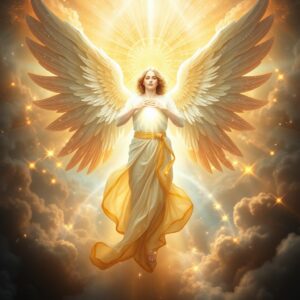
Is this mention of a heavenly assembly isolated? Certainly not:
- Job 1:6 Now there was a day when the sons of God came to present themselves before the Lord, and Satan also came among them.
Here, we see the “sons of God” (which in the Old Testament is always a reference to divine beings) coming to God as an assembly or “council”. Furthermore:
- 1st Kings 22: 19-22 And Micaiah said, “Therefore hear the word of the Lord: I saw the Lord sitting on his throne, and all the host of heaven standing beside him on his right hand and on his left; 20 and the Lord said, “Who will entice Ahab, that he may go up and fall at Ramoth-gilead?” And one said one thing, and another said another. 21 Then a spirit came forward and stood before the Lord, saying, “I will entice him.” 22 And the Lord said to him, “By what means?” And he said, “I will go out, and will be a lying spirit in the mouth of all his prophets.” And he said, “You are to entice him, and you shall succeed; go out and do so.”
This passage illustrates another Divine Council scene, where God is letting the angelic beings in his council participate in a scenario.
With sufficient context in place regarding the “Divine Council”, let’s move to a closely related topic coined by Dr. Heiser as “The Deuteronomy 32 worldview” (don’t worry- we’re getting to Tolkien!).
The Deuteronomy 32 worldview
Deuteronomy 32: 7-9 (ESV):
7 Remember the days of old;
consider the years of many generations;
ask your father, and he will show you,
your elders, and they will tell you.
8 When the Most High gave to the nations their inheritance,
when he divided mankind,
he fixed the borders of the peoples
according to the number of the sons of God.
9 But the Lord’s portion is his people,
Jacob his allotted heritage.
This worldview posits that God divided up humanity into nations (most likely after the Genesis 11 “tower of Babel event”), assigning celestial beings as the spiritual authority over them. This worldview links the divine council with cosmic geography, suggesting spiritual dimensionality to the physical world.
Again, the term “sons of God” here refers to the celestial hosts of heaven, in keeping with Old Testament vernacular. While some translations read “according to the sons of Israel,” potentially distancing the passage from the Divine Council concept, the “sons of God” translation stems from older texts found among the Dead Sea Scrolls, while “sons of Israel” is derived from the Masoretic text, a more recent manuscript. Prioritizing the older script supports “sons of God” as the more accurate translation, aligning the passage with the Divine Council worldview.
Further solidifying this concept of God dividing nations among his celestial family, consider these Old Testament passages:
In Daniel 10, the prophet Daniel prays for weeks without response until an angel finally appears:
- Daniel 10:12-14…20,21 Then he said to me, “Fear not, Daniel, for from the first day that you set your heart to understand and humbled yourself before your God, your words have been heard, and I have come because of your words. 13 The prince of the kingdom of Persia withstood me twenty-one days, but Michael, one of the chief princes, came to help me, for I was left there with the kings of Persia, 14 and came to make you understand what is to happen to your people in the latter days… But now I will return to fight against the prince of Persia; and when I go out, behold, the prince of Greece will come. 21 But I will tell you what is inscribed in the book of truth: there is none who contends by my side against these except Michael, your prince.
Notice the language used here:
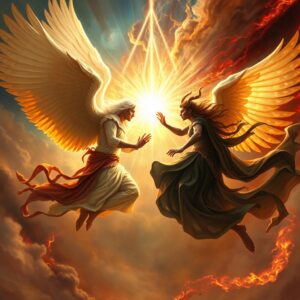
- Vs. 13: “The Prince of the Kingdom of Persia”: This passage would not make sense in a purely physical context, as it is unlikely that a physical king would have the capability of withstanding an Angel of the Lord.
- Vs. 13: “Michael, one of our chief princes”: a decisive reference to the archangel Michael.
- Vs. 20: “now I will return to fight against the prince of Persia; and when I go out, behold, the prince of Greece will come.” Again, as this is an Angel talking: he is not referring to battling physical princes, but rather the spiritual beings that are associated with specific kingdoms.
This passage clearly indicates an epic showdown taking place in a spiritual realm that is intrinsically linked with our physical one, and the Deuteronomy 32 worldview is at the core of it.
One more example:
- Ezekiel 28 1-2 :1 The word of the Lord came to me: 2 “Son of man, say to the prince of Tyre, Thus says the Lord God: “Because your heart is proud, and you have said, ‘I am a god, I sit in the seat of the gods, in the heart of the seas,’ yet you are but a man, and no god, though you make your heart like the heart of a god…
Let’s pause here- Ezekiel is addressing the human ruler of Tyre, using the verbiage “you are but a man, and no god”. However:
- Ezekiel 28:11-14: 11 Moreover, the word of the Lord came to me: 12 “Son of man, raise a lamentation over the king of Tyre, and say to him, Thus says the Lord God: “You were the signet of perfection, full of wisdom and perfect in beauty. 13 You were in Eden, the garden of God… 14 You were an anointed guardian cherub. I placed you; you were on the holy mountain of God; in the midst of the stones of fire you walked.
The second part of this passage shifts to the “king”- the god of Tyre. Notice the supernatural vernacular:
- Vs. 13 You were in Eden, the garden of God… 14 You were an anointed guardian cherub.
In this passage, we see a clear example of a physical nation under the influence of a spiritual being, per the Deuteronomy 32 worldview.
Moreover, this pattern is echoed across the ancient pagan world, where cities, towns, and states often associated themselves with a patron god or goddess:
- Athens: Athena.
- Corinth: Poseidon.
- Delphi: Apollo.
- Atlantis: Atlas.
- Heliopolis: Atum.
- Rome: Jupiter
- Etc…)
As we have just laid out, when we put the bible into its original context, we can see a glimpse of the deep spiritual framework of the cosmos: a supreme deity who presides over an assembly of powerful, yet subservient, divine beings. These beings assemble before this unequaled deity in a celestial council and have been given areas of dominion over the earth.
Those who have read The Silmarillion probably know where I am going with all of this, but for the rest, it’s now time to get into some nerdy tie-ins.
So what does this have to do with Tolkien?
The Ainur/Valar
“There was Eru, the One, who in Arda is called Iluvatar; and he made first the Ainur, the Holy Ones, that were the offspring of his thought, and they were with him before aught else was made.”
-The Silmarillion
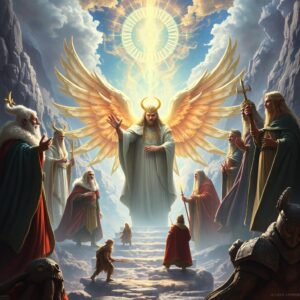
Here we begin to see the connection with Tolkien’s work. As the quote illustrates, the Ainur were the original spirits of Eru/Illuvitar’s creation. Rather than creating the universe alone, Illuvitar invited the Ainur to participate in its weaving. The Valar are the Ainur who chose to reside in Arda (the Earth), aiding in its continued creation.
The Valar (along with the lesser “Maiar”) function as “the gods” of Middle-earth, each one with their own dominion of Arda. For example, Aulë was the god of craftsmanship, Ulmo, the god of the sea, Yavanna, the goddess of life and vegetation, etc. In this sense, the Valar mirror pagan understanding of divine responsibilities, but we also see many close parallels with related angelic intervention in extra-cannonical second-temple Jewish literature, like the book of 1 Enoch – but we will save that discussion for a future time.
The Connections
With the biblical framework pre-established, the connections between Tolkien’s Valar and God’s Divine Council should be increasingly apparent. Allow me to clarify these connections:
- Both the Divine Council and the Valar feature a supreme being who presides over all creation, without equal. While both contain a pantheon of lesser deities, these structures remain clearly monotheistic in nature.
- In both the Deuteronomy 32 worldview and the Valar, the gods are assigned specific responsibilities on behalf of the supreme being.
- The supreme being in both systems chooses not to exert absolute control, instead inviting his creations to influence the world.
- Through this free will, the possibility of evil enters the world. In the following passage, we can see a definitive connection between Melkor, the original rebel of the Ainur, and Satan, the original rebel of the biblical text:
“And when the Ainur had gazed for a while and were silent, Iluvatar said
again: ‘Behold your Music! This is your minstrelsy; and each of you shall find contained herein, amid the design that I set before you, all those things which it may seem that he himself devised or added. And thou, Melkor, wilt discover all the secret thoughts of thy mind, and wilt perceive that they are but a part of the whole and tributary to its glory… Then Ilúvatar spoke, and he said: ‘Mighty are the Ainur, and mightiest among them is Melkor; but that he may know, and all the Ainur, that I am Ilúvatar, those things that ye have sung, I will show them forth, that ye may see what ye have done. And thou, Melkor, shalt see that no theme may be played that hath not its uttermost source in me, nor can any
alter the music in my despite. For he that attempteth this shall prove but mine instrument in the devising of things more wonderful, which he himself hath not imagined.”
– The Silmarillion
Conclusion- what does all this have to do with anything?
The connections we find here are admittedly ironic, given Tolkien’s own words:
“I dislike Allegory – the conscious and intentional allegory – yet any attempt to explain the purport of myth or fairytale must use allegorical language.”
– J.R.R. Tolkien (A letter to Milton Waldman)
Despite his apparent aversion to overt allegory, the clear parallels between Tolkien’s world and a deeply biblical worldview are undeniable. Perhaps this is the beauty of his work: the spiritual implications are present, but require a deeper exploration to uncover.
This certainly prompts the question: Was Tolkien’s allegorical connection with the divine council intentional? While we cannot know for certain, the implications are significant:
- Tolkien’s world provides a reimagining of what the celestial “Divine Council” might resemble. While not doctrine, it allows us to imagine and consider the potential structure of God’s celestial systems. As we learn more about God’s methods, we may gain a deeper understanding of his heart, even if our imaginations pale in comparison to reality.
- The “angelic” Valar, while distinct from Christian doctrine, resonate with biblical realities, offering a fresh perspective. The “Divine Council” can feel distant and intangible, but through Tolkien’s descriptions of the music of the Ainur, the temperament of Ulmo, or Yavanna’s cultivation of Middle-earth, we glimpse how God might engage his family in the ever-unfolding story of the world.
“The mere stories were the thing. They arose in my mind as “given” things, and as they came, separately, so too the links grew. An absorbing, though continually interrupted labour (especially since, even apart from the necessities of life, the mind would wing to the other pole and spend itself on the linguistics): yet always I had the sense of recording what was already ‘there’, somewhere: not of ‘inventing’.”
– J.R.R. Tolkien (A letter from Tolkien to Milton Waldman)
Stories possess a profound power.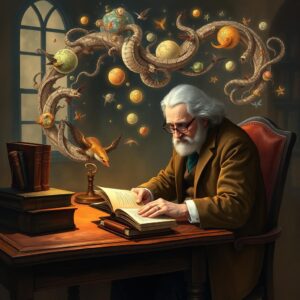
Tolkien described his creative process as a form of “recording,” rather than “inventing.” Could Tolkien have been tapping into a deeper truth as he crafted his tales? The uncanny connections we’ve uncovered suggest this possibility.
As an author myself, I understand this sensation to an extent. During the creation of my book, ‘The Veil,’ I experienced moments where I felt as though I was channeling pre-existing concepts, rather than merely fabricating them. Many steeped in the creative process have reported similar experiences. Perhaps this phenomenon is merely a quirk of creativity – or perhaps we are tapping into something beyond our conscious understanding.
Ultimately, this exploration of the connections between Tolkien’s Ainur and God’s Divine Council reveals intriguing correlations. Whether Tolkien intentionally drew upon this knowledge or not, his stories remain among the greatest ever told. All this being said, next time you watch The Two Towers or The Hobbit, and the next time you read your bible or ponder the mysteries of the cosmos, consider the correlations we discussed today, and may it cause you to reconsider the structure of this universe and how you fit into it.
– Daniel P. Glick,
Author of The Veil
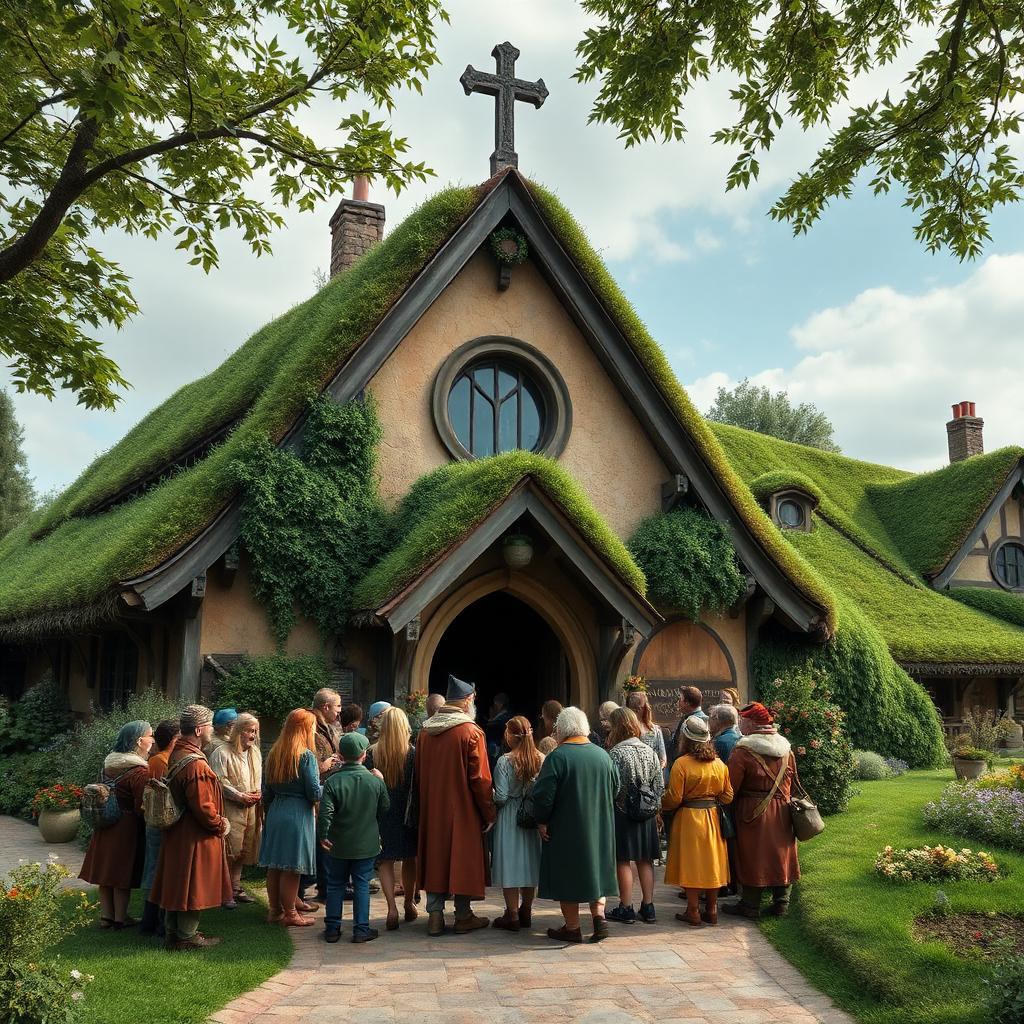
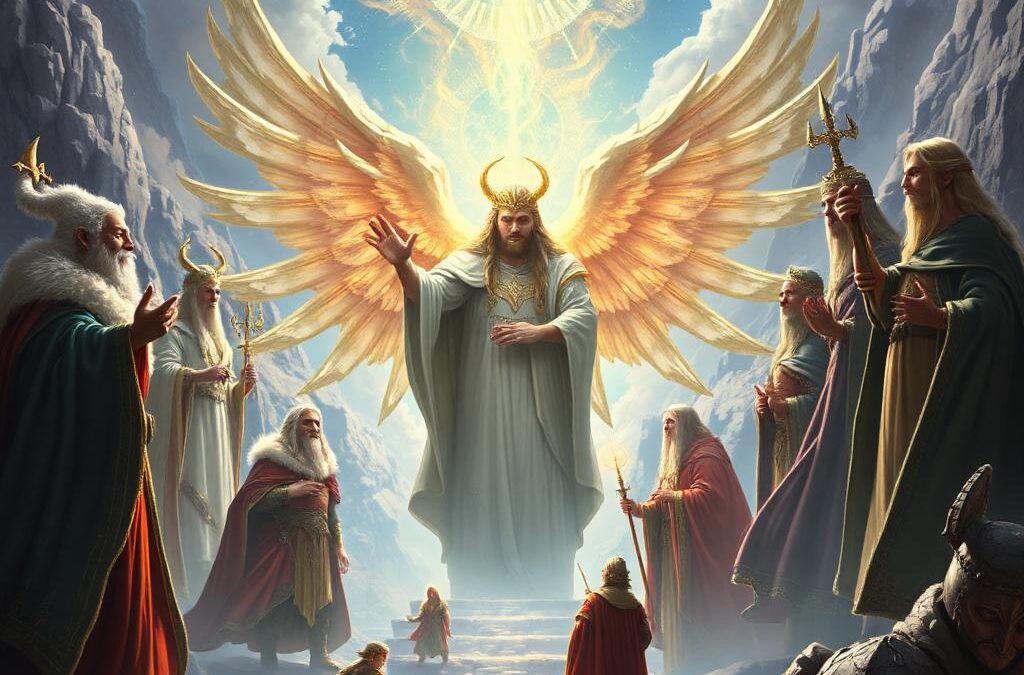
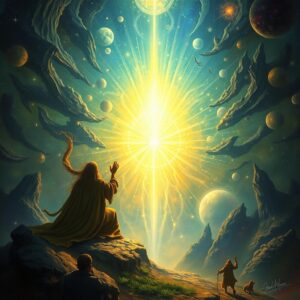
Be sure to check out the show I did with The White City podcast on this topic!
Youtube: https://www.youtube.com/watch?v=Kb6uAk1IaOk&ab_channel=TheWhiteCity
Spotify: https://open.spotify.com/episode/3OmMnuLVryzE5ZY6eL3kxa?si=ebd8ab4a06234e41